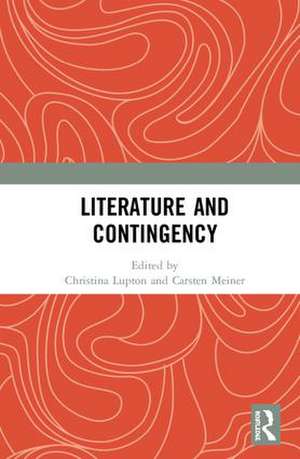Literature and Contingency
Editat de Christina Lupton, Carsten Meineren Limba Engleză Hardback – 19 feb 2019
The defining feature of contingency lies in the suggestion that things that have already happened might have been otherwise. Central to late twentieth century European critical and sociological thinking, that argument is at the centre of this volume. The contributors to this volume explore subjects including how literature, philosophy and history all cope with contingency; the existence of contingency in genres as diverse as enlightenment fables, Aristotle, Hardy, Jane Austen, and post-war American literature; the contingency of old age and the poetics of contingency. As the chapters here illustrate, our efforts to understand each other involve a constant opening onto being otherwise; an enterprise in which the role of the literary critic remains key.
Of interest to scholars across a range of literary genres, this volume would also have applications for philosophy researchers exploring the metaphysics of contingency. This book was originally published as a special issue of Textual Practice.
Preț: 998.71 lei
Preț vechi: 1217.94 lei
-18% Nou
Puncte Express: 1498
Preț estimativ în valută:
191.09€ • 200.59$ • 158.62£
191.09€ • 200.59$ • 158.62£
Carte tipărită la comandă
Livrare economică 11-25 aprilie
Preluare comenzi: 021 569.72.76
Specificații
ISBN-13: 9780367192037
ISBN-10: 0367192039
Pagini: 186
Dimensiuni: 156 x 234 x 18 mm
Greutate: 0.41 kg
Ediția:1
Editura: Taylor & Francis
Colecția Routledge
Locul publicării:Oxford, United Kingdom
ISBN-10: 0367192039
Pagini: 186
Dimensiuni: 156 x 234 x 18 mm
Greutate: 0.41 kg
Ediția:1
Editura: Taylor & Francis
Colecția Routledge
Locul publicării:Oxford, United Kingdom
Public țintă
Postgraduate and UndergraduateCuprins
Introduction: Literature and Contingency 1. ‘L’essentiel, c’est la contingence’: how literature does and does not cope with contingency 2. Accidental gods: figures of contingency in the enlightenment fable 3. Contingency in philosophy and history, 1650-1800 4. War atmospheres 5. Contingency in/of the text: Aristotle, Hardy, Perec 6. ‘Without you, I am nothing’: on the counterfactual imagination in Emma 7. The moment of truth: Proust, Barthes, and the contingency of old age 8. Luck stories: stress-testing contingency and agency at the margins of post-war American literature 9. Poetics of contingency
Notă biografică
Christina Lupton is Professor of English and Comparative Literature, and Director of the Humanities Research Institute, at the University of Warwick, UK. She works on the theory of the book, and the history of reading from the eighteenth century to the present. Her recent book, Reading and the Making of Time (2018), looks at reading as an activity that is both materially defined by the codex format, and politically tied up with the history of work and leisure.
Carsten Meiner is Professor of French Literature and Culture at the University of Copenhagen, Denmark. He works on the critical articulations of typical French cultural phenomena, such as rebellions, gallantry, gastronomy, and intellectualism in French literary history. He is the director of the research project "Cultures of Topology: French literary history" at the University of Copenhagen. His publications include Les Mutations de la clarté (2007), Le Carrosse littéraire. L’Invention du hasard (2008), and The Cultural Life of Catastrophes (2012).
Carsten Meiner is Professor of French Literature and Culture at the University of Copenhagen, Denmark. He works on the critical articulations of typical French cultural phenomena, such as rebellions, gallantry, gastronomy, and intellectualism in French literary history. He is the director of the research project "Cultures of Topology: French literary history" at the University of Copenhagen. His publications include Les Mutations de la clarté (2007), Le Carrosse littéraire. L’Invention du hasard (2008), and The Cultural Life of Catastrophes (2012).
Descriere
This collection features leading literary critics and explores the role of language in thinking about the ways in which the world might be otherwise, and the history of contingency as a longstanding literary concept. This book was originally published as a special issue of Textual Practice.
